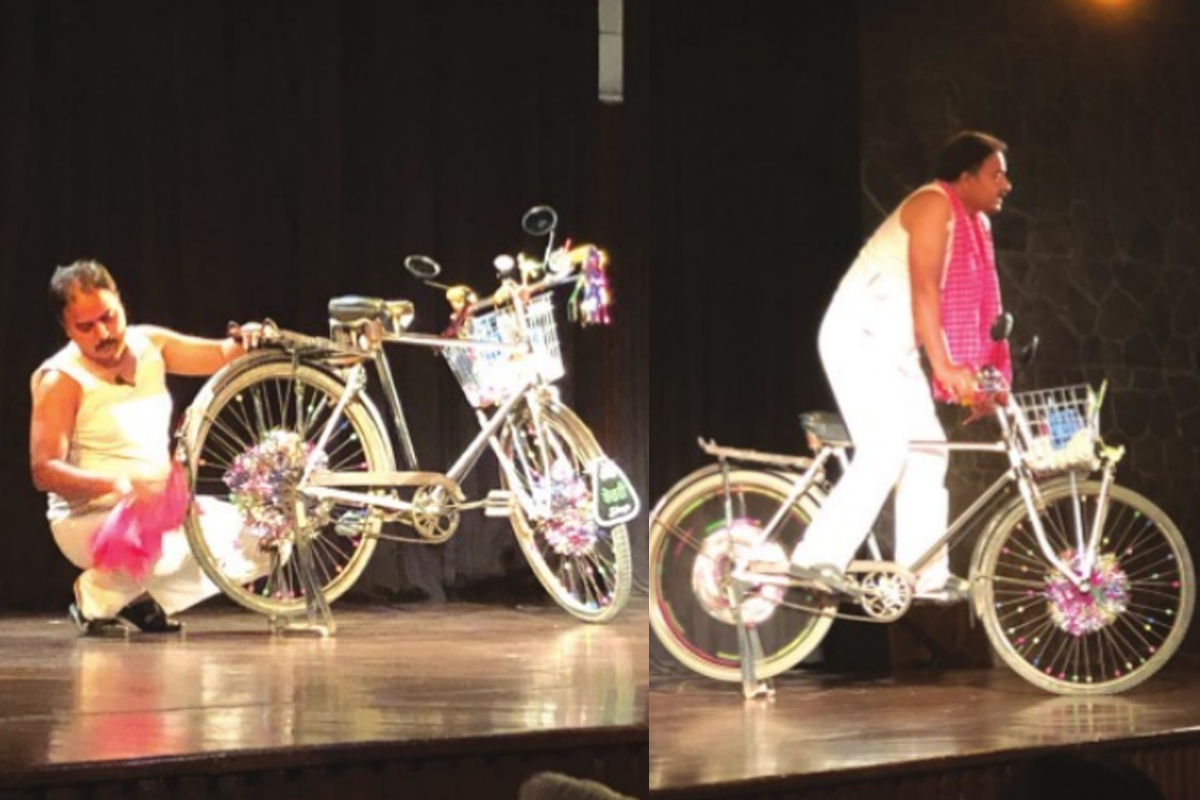Ajay Devgn recalls feeling spiritual energy while shooting of ‘Bholaa’
Ajay is seen flaunting his chiselled abs as he stands in front of the Shivling pouring water and seeking blessings of Lord Shiva
Modern day Varanasi and its woes came alive on stage with Benaras ka Thug. A review by Aruna Bhowmick.

Photo: SNS
The India International Centre recently staged Banaras ka Thug, a selection from Khwaja Ahmad Abbas’ short story of the same name. Directed by theatre guru Anuradha Kapur, the enactment was greatly enriched by Vidya Rao’s vocal renditions of Kabir bhajans, punctuated by Faiz, Ghalib and Jighar’s compositions.
“The reason why K A Abbas needs revisiting today is the relevance of his virtually allegoric writings as per our times,” stated Anuradha Kapur. The story takes us through the streets of Banaras, recently renamed Varanasi, in the company of an old resident, who has returned to his hometown after several years. With the single stage prop of a wellembellished bicycle, protagonist “Traveller” Danish Iqbal fills the stage like a team, single-handedly holding the audience captivated.
Much has changed in this city of his childhood since he was last here. It has now grown and prospered, with silk, brocade and fine woollen garments to now able to protect the affluent from the bitter cold night. He notices, though, the poor woman clutching her baby uncovered and shivering out in the cold. The injustices of society at first bewilder, then begin to irk him no end. He pulls off the woollen shawl from Seth Karorimal Pakorimal’s shoulders and hands it over to the shivering mother and child, staging a nifty escape each time the crowd sets out to chase him.
Advertisement
Seeking shelter for the night he is turned down both by the temple pujari as well as the maulvi of the masjid, for he calls himself neither a Hindu nor a Muslim, but only a human being!
The site of his ire is also the cremation ground, where cremating the dead is a lucrative business like any other, and is “slow” these days as people do not mind dying at home instead of coming to Banaras to die, as per common Hindu practice. An elderly man has not enough money to undertake cremation expenses for his dead son, and so is harshly turned out. When a rich man is brought in for his last rites, and the pyre gets going full flame, our protagonist cannot resist lifting the dead son and placing it on the pyre, much to the chagrin of busybodies and caretakers.
Danish Iqbal and his bicycle give a flawless performance in partnership of each other, alter nately engaged in riding round the stage, or in maintenance of the prized wheeled apparatus. “I took to it because I somehow find a bicycle remotely reminiscent of a charkha or the spinning wheel, irreplaceable as the common man’s mode of transport, all the more relevant today in its humble pollution-free status,” remarks the director.
The cycle could well be taken as a representation of Sant Kabir’s enormous energy, positivity and robustness, readily on the move from one locale to another. Vidya Rao’s gently graded voice, lowered at times to mere ambience, was gratifying. Himanshu B Joshi’s subtle lighting portrayed space and time effectively, and Nihal Kadam’s production control would have to be efficient for the rest of everything to have moved so seamlessly. As for Nihal’s Cycle Fabrication ~ it easily vied with the stage presence of Danish himself in its role of inseparable friend and long-standing companion. Kudos to Anuradha Kapur for crisp and compact piece of story telling.
Advertisement